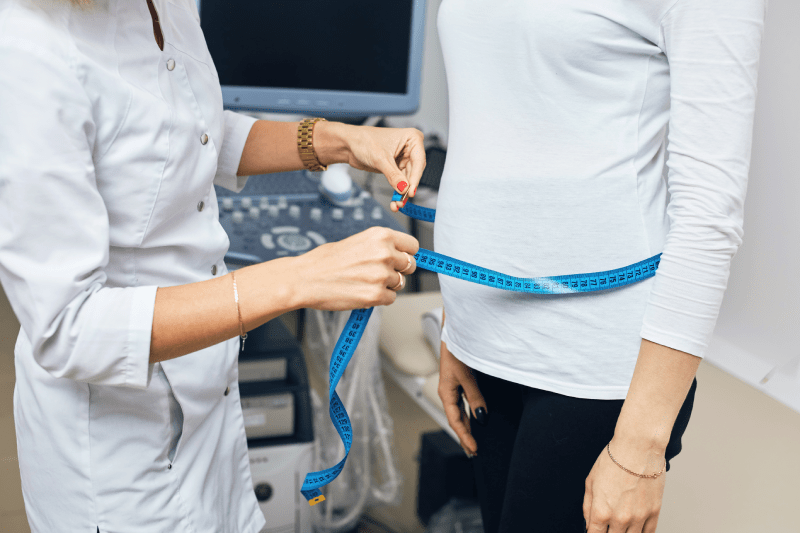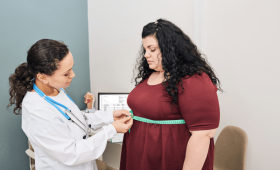Who Is Suitable For Gastric Sleeve Surgery?
There are necessary criteria to qualify for gastric sleeve surgery. Sleeve gastrectomy, which is the stomach reduction surgery, can be performed on individuals between the ages of 18 and 65. For a person to be a suitable candidate for stomach surgery, their Body Mass Index (BMI) value should be 40 or above. If the BMI value is below this number, the patient may still be suitable for the surgery after consultation, especially if they have obesity-related diseases such as sleep apnea or diabetes. Therefore, if you want to find out whether you are suitable for the surgery, you can contact us. You can get an answer by consulting with our medical professionals, who will conduct a thorough review of your health history and current condition to make the most informed decision possible for your well-being.
What Is The Minimum Body Mass Index Required For Surgery?
Generally, the accepted minimum BMI for surgery is 40. However, this limit drops to BMI 35 if the patient has obesity-related health issues (comorbidities). For instance, conditions like severe joint problems, cardiovascular disease risk factors, or obesity-related fatty liver disease can make individuals in the 35-40 BMI range candidates. The surgery’s goal is not merely weight loss but also the treatment or control of these co-existing conditions. Therefore, BMI alone does not determine whether you can have the surgery. You must consult with an expert to learn if you are suitable for the treatment. The final decision rests on a comprehensive assessment by a multidisciplinary team.
What Is The Age Limit For Surgical Suitability?
Generally, individuals between the ages of 18 and 65 can undergo the surgery. However, these limits are not rigid; in some cases, people younger than 18 and older than 65 who are in good general health (apart from obesity) can also receive treatment. The decision-making process for children and adolescents is much more detailed and sensitive, involving pediatric surgery and endocrinology specialists, considering their growth and development. Age is only one factor; the individual’s biological age and overall resilience are often more decisive. Therefore, no article you read can definitively state whether you are suitable. If you plan to undergo treatment, you must have a consultation to confirm your suitability.
Can I Have Surgery If My Previous Weight Loss Attempts Failed?
Yes, Gastric Sleeve treatment is suitable for individuals who have previously tried to lose weight through diet or exercise but have failed to achieve lasting success. However, it must be understood that gastric sleeve surgery will not magically lead you to your ideal weight. Instead, it will reduce your stomach’s food capacity, and you will lose weight by strictly following the list provided by your dietitian post-surgery. Therefore, if you plan to have gastric sleeve surgery, you must know that you will need to continue with a challenging diet process and exercise after recovery. On the other hand, since the surgery will shrink your stomach, you will not be able to consume the portions you ate before the surgery even if you wanted to, which will make it easier to stick to your diet willpower than before.
Does Having Diabetes Prevent Me From Having Surgery?
No, on the contrary, the presence of Type 2 diabetes is one of the most important co-existing conditions that encourages considering the surgery, especially in individuals with a BMI of 35 and above. Gastric sleeve surgery is quite successful in controlling diabetes and even achieving complete remission in some cases. This surgery does not only provide mechanical restriction but also alters the regulation of intestinal hormone secretion, increasing insulin sensitivity and regulating blood sugar. The severity of diabetes and associated complications must be thoroughly examined before the operation to ensure the best possible outcome for metabolic health improvement.
Can People With High Blood Pressure Have The Surgery?
Yes, you can have gastric sleeve surgery if you have high blood pressure (hypertension). This is because high blood pressure is often caused by your excess weight. In this case, your blood pressure will gradually return to normal as you begin to lose weight after the surgery. Many patients experience a reduction in medication dosage or cease medication use entirely. Before the surgery, a comprehensive evaluation by anesthesiologists and cardiologists is performed to ensure the blood pressure is stable. Uncontrolled very high blood pressure can pose a risk during the surgery, so it must be stabilized first. Generally, however, patients with high blood pressure can easily undergo the surgery, meaning high blood pressure is not an impediment to having gastric sleeve surgery.
Can Someone Weighing 90Kg Have Gastric Sleeve Surgery?
As mentioned above, the essential information required for a patient to undergo surgery is not their weight but their Body Mass Index (BMI). Thus, if the patient’s BMI is 40 or above, or if it is less than 40 but they have obesity-related diseases, they can be treated. However, a patient’s weight alone does not determine whether they can receive treatment. BMI takes into account both weight and height, offering a more accurate measure of obesity and associated health risks. Therefore, a consultation with a specialist is necessary to evaluate your specific BMI and overall health condition to determine your eligibility for the procedure.
Which Medical Tests Are Performed Before Surgery?
In the pre-operative process, a series of comprehensive medical tests are conducted to determine the person’s overall suitability and risks for the surgery. These usually include blood tests (complete blood count, biochemistry, thyroid functions), endoscopy (to examine the stomach and esophagus), ultrasonography (to assess the abdominal organs, especially the liver), and a cardiac evaluation (ECG, ECHO if necessary). Additionally, lung function tests and detailed vitamin-mineral level measurements are frequently requested. This thorough assessment ensures all underlying conditions are identified and managed before proceeding with the operation, maximizing patient safety.
Why Is Endoscopy Mandatory?
Endoscopy is mandatory before gastric sleeve surgery to thoroughly examine the inner surface of the stomach and esophagus. This procedure detects ulcers, gastritis, polyps, or bacterial infections, particularly Helicobacter Pylori, that may exist in the stomach. Endoscopy helps to identify any condition that could impede the surgery or increase the risk of post-operative complications, allowing for necessary treatment to be initiated beforehand. Knowing the exact state of stomach health is critical for the surgery to be safe and successful, as issues like unhealed ulcers could pose significant dangers to the staple line integrity.
What Is The Purpose Of The Pre-Operative Diet?
The primary purpose of the protein-rich, low-calorie diet applied before the surgery is to shrink the liver. In obese individuals, the liver is often fatty and enlarged; this restricts the surgeon’s view during laparoscopic surgery and increases the risk of the operation. When the liver shrinks, the surgeon’s access to the stomach is facilitated, significantly enhancing the safety of the surgery. This diet also serves as a preparation phase for the patient to start adapting to the new post-operative nutritional routine, making the transition to life after surgery much smoother and more manageable.

Why Is Psychological Evaluation Necessary?
Psychological evaluation is absolutely necessary to understand how ready the patient is for the challenges they will face after the surgery and for the long-term lifestyle changes. Surgery has a significant impact on eating habits and emotional responses. A psychologist or psychiatrist evaluates the patient’s history of eating disorders, expectations from the surgery, and the need for support post-surgery. This evaluation helps determine if the patient has the mental resilience and motivation to make the surgery’s success permanent, ensuring that psychological factors do not undermine the physical benefits of the operation.
How Long Does The Surgery Take?
Gastric sleeve surgery (sleeve gastrectomy), when performed using the laparoscopic method (keyhole surgery), usually takes approximately 60 to 90 minutes. This duration may vary depending on the patient’s anatomy, the size of the liver, and the surgeon’s experience. Anesthesia preparation and waking time are not included in the surgery duration itself. Laparoscopic surgery offers the advantages of faster recovery and less pain because it is performed through small incisions in the abdomen instead of a large cut, allowing the patient to mobilize more quickly post-operation.
How Is The Surgery Performed?
Gastric sleeve surgery is predominantly performed today using the laparoscopic (keyhole) method, which involves making several small incisions (usually 4-5) in the abdomen. The surgeon uses thin instruments and a camera inserted through these incisions to operate on the stomach. Approximately 75-85% of the stomach is permanently removed, and the remaining part is shaped into a tube. This method has the advantages of less scarring, less pain, and a shorter hospital stay compared to traditional open surgery, significantly improving the patient’s post-operative comfort and recovery timeline.
Which Anesthesia Method Is Used In The Surgery?
Since gastric sleeve surgery is a major surgical procedure, it is performed under general anesthesia. General anesthesia ensures that the patient is completely asleep during the operation and feels no pain. Before the surgery, the anesthesia team thoroughly evaluates the patient’s medical history and current health status to prepare the most suitable and safe anesthesia plan. The anesthesiologist closely monitors vital functions throughout the operation and maintains the patient’s comfort at the highest level, ensuring a smooth and controlled procedure from start to finish.
What Is The Typical Length Of Hospital Stay?
The length of hospital stay after gastric sleeve surgery generally varies between 2 and 4 days, depending on the patient’s overall recovery rate and the presence of any complications. During this period, the patient’s pain is managed, the first liquid intake begins, and they are closely monitored for any potential early complications. For the patient to be discharged, they are expected to be able to take sufficient fluids orally and perform basic movements independently. This stay is essential for the medical team to ensure stability before the patient continues recovery at home.
What Is The Pain Level Like After Surgery?
Since the surgery is performed using the laparoscopic method, less and more controllable pain is expected compared to open surgery. Throughout the hospital stay, pain is effectively managed with strong painkillers given intravenously or orally. The first 24-48 hours are the period of most intense pain, but after discharge, most patients can continue their daily lives with prescribed mild pain relievers. Although the intensity of pain varies from person to person, pain management is highly successful with modern anesthesia and surgical techniques, prioritizing patient comfort during the critical recovery phase.
What Is The Recovery Period?
Generally, most patients can return to their normal, desk-based jobs within 1 to 2 weeks. Full recovery and return to heavy physical activities (heavy lifting, intense sports) can take 4 to 6 weeks. The recovery period depends on the person’s age, general health condition, and how well they adhere to post-operative instructions. Prioritizing rest during this process and being careful about the care of the incision sites are critical for a fast and smooth recovery, minimizing the risk of complications like hernias or infections.
How Does Post-Operative Nutrition Begin?
Post-operative nutrition is a gradually progressing and strictly rule-bound process aimed at adapting to the new stomach and supporting healing. Generally, only sips of water are allowed on the first day. This is followed by phases of clear liquids for a few weeks, then full liquids (pureed foods), and finally soft solid foods. Each stage is vitally important to prevent a feeling of stomach stretching and to avoid overloading the digestive system. The foundation of long-term success relies on adhering to this adaptation process diligently and patiently.
Which Foods Should Be Avoided In The Long Term?
In the long term after gastric sleeve surgery, certain foods, including high-sugar foods, carbonated drinks, and excessively fatty foods, should be continuously avoided. Carbonated drinks can distend the stomach and cause discomfort, while high-sugar and fatty foods hinder adequate weight loss or increase the risk of dumping syndrome. Additionally, starchy foods like bread and rice should be consumed carefully to avoid causing stomach obstruction. It is essential to work with an expert dietitian to create a personalized nutrition plan that supports your new lifestyle and health goals.
Is Supplement Use Mandatory After Surgery?
Yes, the use of vitamin and mineral supplements is generally mandatory for life after gastric sleeve surgery. Because a portion of the stomach is removed, the absorption of essential nutrients like B12, iron, calcium, and Vitamin D is reduced. These deficiencies can lead to serious health problems, so taking regular supplements prevents these risks. The type and dosage of supplements should be regularly adjusted by a specialist based on individual needs determined by periodic blood tests, ensuring your body receives the necessary nutrients for long-term health.

What Is The Success Rate Of The Surgery?
The success rate of gastric sleeve surgery is quite high in terms of significant excess weight loss and the improvement of obesity-related diseases. Patients generally lose an average of 60% to 75% of their excess weight within the first 12 to 18 months after the surgery. Success is measured not only by weight loss but also by improved quality of life, remission of co-existing diseases, and the sustainability of a long-term healthy lifestyle. The patient’s adherence to the new regimen is the most important determinant of this success.
Is There A Risk Of Weight Regain In The Long Term?
Yes, as with any bariatric surgical procedure, there is a risk of some weight regain in the long term after gastric sleeve surgery. This risk is usually associated with the patient returning to old, poor eating habits or an inactive lifestyle after the first two years post-surgery. The key to preventing weight regain is to view the surgery as a starting point and commit to lifelong discipline in nutrition, exercise, and mental health. Regular follow-up minimizes this risk and provides the necessary support for sustained weight management.
What Are The Possible Complications Of The Surgery?
Like any surgical procedure, gastric sleeve surgery has some possible complications. The most common in the early stage include bleeding, infection, staple line leakage, and anesthesia-related risks. In the long term, conditions such as vitamin deficiencies, development of reflux, or gastric stenosis may occur. Choosing an experienced surgical team and a fully equipped center is the most important factor in minimizing these risks. The patient must be thoroughly informed about potential risks and commit to all post-operative instructions for optimal safety.
Is Reflux Developed After Surgery?
In some patients after gastric sleeve surgery, new or existing gastroesophageal reflux (heartburn) symptoms may develop or increase. Reshaping the stomach into a tube can increase pressure within the stomach and affect natural anti-reflux mechanisms, creating a predisposition to reflux. In most cases, this condition can be controlled with medication. If severe reflux is present before the surgery, this situation should be specially evaluated by the surgical team when choosing the type of surgery (e.g., considering a bypass instead of a sleeve).
When Should Physical Activity Be Started After Surgery?
Light walking is encouraged even in the first few days after surgery, as this increases blood circulation and reduces the risk of blood clots. More intense physical activities and exercise programs are generally allowed 4 to 6 weeks later. During this time, the abdominal muscles are expected to heal completely. Heavy lifting and movements that strain the abdominal muscles must be strictly avoided immediately after the surgery. Exercise is vital not only for supporting weight loss but also for maintaining overall long-term health and muscle mass.
How Is Skin Sagging Managed After Surgery?
Skin sagging is a common occurrence after rapid and significant weight loss. Management includes gaining muscle mass through exercise to fill the space beneath the skin, skin care and moisturizing, and in advanced cases, body contouring (plastic) surgeries. Plastic surgery operations should generally be considered when weight loss has completely stabilized (usually 1-1.5 years after the surgery). This is a personal decision and varies depending on the individual’s level of discomfort and skin elasticity, requiring careful consultation with a plastic surgeon.
Why Is Adequate Water Consumption Important?
Adequate water consumption after gastric sleeve surgery is critically important for preventing dehydration and supporting the function of the new stomach. Since the capacity of the new stomach is reduced, it becomes difficult to consume large amounts of fluid at once, so water must be consumed frequently and in small sips throughout the day. Dehydration can lead to serious health problems and negatively affect the recovery process. Water also supports the feeling of fullness and helps prevent common complaints such as constipation, making it a crucial component of the recovery plan.
Will I Experience Hair Loss After Surgery?
Yes, experiencing temporary hair loss is common after gastric sleeve surgery, especially within the first 3 to 6 months. This loss results from rapid weight loss, the stress of the surgery, and temporary protein/vitamin deficiencies during this period. The hair loss is usually temporary and resolves on its own within 6-12 months once the body adapts to the new nutritional regimen and vitamin-mineral supplements are taken regularly. Regular use of zinc and biotin supplements is specifically recommended during this phase to support hair health and minimize the duration of the shedding.
How Long Should I Wait To Become Pregnant?
Female patients who have undergone gastric sleeve surgery are strongly advised to avoid becoming pregnant for at least 12 to 18 months while rapid weight loss continues. This rapid weight loss period carries the risk of nutritional deficiencies for both the mother and the developing baby. A safe pregnancy can be planned after the body has reached nutritional balance and weight has stabilized. Close follow-up with a gynecologist and dietitian before and during pregnancy is critical in this process to ensure the health of both mother and child.

Does Smoking Prevent Me From Having The Surgery?
Smoking is a major risk factor in the pre- and post-operative period. Smoking must be strictly quit before surgery as it negatively affects the risk of anesthesia complications and wound healing. It has been scientifically proven to significantly increase the risk of a leak from the staple line in the stomach. Individuals who want to have surgery are expected to have quit smoking permanently before the surgical decision is made and not to start again after the operation, prioritizing their long-term health and surgical success.
When Is Alcohol Consumption Allowed?
Alcohol consumption should be strictly avoided for the first 6 months after the surgery. The new stomach absorbs and metabolizes alcohol much faster, which causes the patient to become intoxicated more quickly and increases the risk of alcohol poisoning. Furthermore, alcohol contains empty calories and can negatively affect weight loss. Even after 6 months, alcohol consumption should be kept very limited, and carbonated drinks and cocktails should be avoided in particular. This restriction is important for the long-term success of the surgery and the prevention of nutritional setbacks.
How Do Obesity-Related Medications Change After Surgery?
The dosages of high blood pressure and diabetes medications used due to obesity can change rapidly or even be completely discontinued after the surgery. Because weight loss starts very quickly, your surgical team and internal medicine doctor will closely monitor the dosage of your medications and make the necessary adjustments immediately. It is dangerous for patients to stop or change the dosage of their medications on their own; all changes must be made under the guidance of a physician. This rapid metabolic improvement is one of the key successes of bariatric surgery.
Is Psychological Support Necessary After Surgery?
Gastric sleeve surgery triggers a significant emotional and psychological change process in addition to physical transformation. Many people require psychological support due to their new body, changing social relationships, and the complex relationship with food post-surgery. Group therapy, individual counseling, or online support groups are highly beneficial in helping the patient cope with emotional difficulties and maintain long-term behavioral changes during this transition. This support is crucial for reinforcing behavioral changes and preventing reliance on emotional eating habits.
How Should I Start My Exercise Routine?
It is essential to start the exercise routine slowly and gradually. In the first weeks after surgery, only short, low-intensity walks are recommended. As recovery progresses, activities like swimming and light cardio can be introduced after 4 to 6 weeks. It is important to get approval from your surgical team before starting weight training. The goal initially should be to boost metabolism and increase endurance rather than building a large muscle mass, ensuring a safe and sustainable return to physical activity.
Can The Surgery Be Considered A Permanent Solution?
Gastric sleeve surgery is an extremely effective tool with high potential for providing lasting weight loss in the treatment of obesity, but it cannot be called a “permanent solution” on its own. The surgery permanently reduces the stomach’s capacity and changes hormone balance, but if the patient’s lifestyle (diet, exercise, mental health) reverts to old, unhealthy habits, the results will not be permanent. Success is achieved by the combination of the surgical procedure and the patient’s commitment to lifelong nutritional and behavioral changes, highlighting that the surgery is a tool, not a cure-all.
What Are The Metabolic Effects Of The Surgery?
Gastric sleeve surgery does not only shrink the size of the stomach but also creates significant metabolic effects. The level of Ghrelin hormone, which is secreted from the removed part of the stomach and increases appetite, decreases. This hormonal change increases the feeling of satiety and reduces appetite. Furthermore, the faster delivery of food to the intestines positively affects insulin sensitivity, which is effective in the remission of Type 2 diabetes, and the secretion of other intestinal hormones. These metabolic changes are a crucial part of the surgery’s overall success in improving metabolic health beyond simple weight loss.
Will My Medication Use Change After Surgery?
Yes, the use and form of many medications will change after the surgery. Painkillers, vitamins, and medications for co-existing diseases are especially reviewed. After the surgery, medications may need to be crushed, chewed, or taken in liquid form, as large tablets may be difficult to pass through the new stomach and gastric outlet. Your doctor will adjust the dosages of your current medications and recommend necessary supplements against potential changes in absorption, ensuring that your medication regimen remains effective and safe post-operatively.
How Long Do Pre-Operative Assessments Take?
The pre-operative assessment process can vary from a few days to a few weeks, depending on the person’s health status and the number of necessary consultations. During this process, comprehensive examinations and tests are performed by different specialists such as internal medicine, cardiology, psychiatry, and dietetics. The goal of all these evaluations is to minimize the risks of the surgery and ensure that the patient is fully prepared for the operation. A fast yet complete assessment is the key to a safe surgery and a successful outcome.
What Kind Of Check-ups Are Required After Surgery?
Post-operative check-ups should be very frequent in the first year (usually weekly in the first month, then monthly), and less frequent in subsequent years (usually once or twice a year). In these check-ups, your weight, nutritional status, and vitamin and mineral levels are closely monitored with blood tests. Regular check-ups are vital for detecting and intervening in potential nutritional deficiencies or long-term complications at an early stage. These follow-ups are an indispensable part of a successful lifelong process, ensuring sustained health.
Are Support Groups Important After Bariatric Surgery?
Yes, participation in support groups after bariatric surgery is extremely important and has been observed to increase the success rate. These groups allow sharing experiences with other individuals who are coping with the physical, emotional, and social challenges brought about by the surgery. Support groups provide a safe environment that helps maintain high motivation, learn practical tips, and adhere to long-term lifestyle changes. These communities prevent patients from feeling alone and reinforce the sense of accountability, which is key to long-term success.
What Will Be The Food Capacity Of My New Stomach?
The remaining tube-shaped stomach after surgery will have a very small volume initially (generally around 30-60 ml). This means that only a few tablespoons of food or fluid can be consumed at one sitting. Over time, the remaining part of the stomach may stretch a little, but it will never reach your old stomach capacity. This limited capacity of your new stomach supports weight loss by allowing you to feel full for a long time and control your portions effectively, promoting lasting changes in eating habits.
What Factors Affect The Cost Of The Surgery?
Many factors affect the cost of the surgery: the economic conditions of the country or city where the surgery is performed, the hospital and technology standards used, the experience of the surgical team, and the scope of the post-operative follow-up package are some of these factors. Pricing usually includes pre-operative tests, the surgical procedure, hospital accommodation, anesthesia, and, in some centers, the first year’s nutritional follow-ups. You should request the most accurate and transparent cost information directly from the centers you prefer, ensuring all services are clearly itemized.

Is Revision Surgery Possible If The First One Is Unsuccessful?
Yes, revision surgery (corrective surgery) may be an option if the gastric sleeve surgery fails to provide sufficient long-term weight loss or if it develops serious complications like severe reflux. Revision surgery may involve changing the type of the initial surgery (e.g., transitioning from a sleeve to a bypass) or re-tightening the gastric sleeve. This is generally a more complex procedure than the initial surgery and requires careful medical evaluation for suitability. Patients are often first encouraged to review and strictly adhere to their nutritional habits before revision is considered.
Which Occupations Can Return To Work Faster After Surgery?
Since the recovery period after gastric sleeve surgery is short, those working in desk-based and low-physical-exertion occupations (e.g., office workers, software developers, teachers) can usually return to work faster, within 1 to 2 weeks. Those working in jobs that require heavy lifting, continuous standing, or intense physical activity should wait until they are fully recovered (generally 4 to 6 weeks) and must pay attention to physical restrictions. Prioritizing healing ensures that no complications arise due to premature physical strain.
What Is The Effect Of Surgery On Emotional Eating?
Although gastric sleeve surgery provides physical restriction, it does not directly eliminate the habit of emotional eating. In the post-operative period, the individual must develop new and healthy coping mechanisms instead of food to deal with emotions such as stress, anxiety, or boredom. Seeking psychological support and developing awareness during this process is critical to breaking the cycle of using food as an emotional escape mechanism. Coping with emotional eating is one of the keys to long-term success. By receiving psychological support after the surgery, the emotions causing this emotional eating are determined by sharing which foods you crave, even if you are not hungry, with our specialists, thus preventing the patient’s emotional eating disorder.
How Does Sexual Life Change After Surgery?
Sexual life after bariatric surgery is generally positively affected. Increased energy levels, better self-confidence, and reduced obesity-related hormonal problems due to weight loss can improve sexual desire and performance. When you can physically return to sexual activity parallels the timing of returning to other physical activities; caution is generally advised for the first few weeks. Most importantly, the psychological relief that comes with adapting to a new body image enhances the quality of sexual life. However, it is still important to wait a few weeks before engaging in sexual intercourse, as excessive movement can cause pain at the incision sites.
When Can I Start Driving After Surgery?
Generally, you can start driving after gastric sleeve surgery once your pain starts to decrease and you stop using painkillers. This is usually possible within approximately 1 week. However, it is still important to first drive short distances and make sure you do not experience any problems before embarking on long journeys. This is because sudden turns or braking while driving can cause your body to tense up, which could cause pain at the incision sites, necessitating careful reintroduction to driving.
What Are The Advantages Of Having Surgery Abroad?
Where you choose to receive treatment abroad is quite important. For example, if you live in Germany and plan to have gastric sleeve surgery in the Netherlands, this would lead to a higher cost than the treatment you would receive in Germany, along with expenses like airfare, accommodation, and transportation. However, if you live in Germany and plan to have treatment in Turkey, even if you include accommodation, transportation, surgery, and a vacation period in Turkey, the cost will be much lower than the amount you would pay in Germany. Therefore, it is very important to research your “abroad” choices carefully. If you are also planning to receive treatment in Turkey, you can contact Cure Holiday to take advantage of all-inclusive packages designed for convenience and value.
Is Nausea Normal During The Post-Operative Period?
Mild to moderate nausea is normal in the early post-operative period. This is usually due to the effects of anesthesia, adapting to the new stomach volume, and the painkillers administered. Nausea is generally controlled with medication and decreases within the first few days. However, severe, continuous nausea or vomiting increases the risk of dehydration and could be a symptom of a more serious problem, such as a leak. In such a case, you must immediately contact your doctor for an urgent assessment and intervention.
Why Cure Holiday?
As Cure Holiday, we are here to provide you with a comprehensive medical tourism experience, bringing you together with experienced specialists to offer the most suitable surgical solution throughout the process. For all your questions regarding this significant life decision, you can contact Cure Holiday immediately for professional support. We hope you make a profound assessment and the most accurate decision on this matter.



